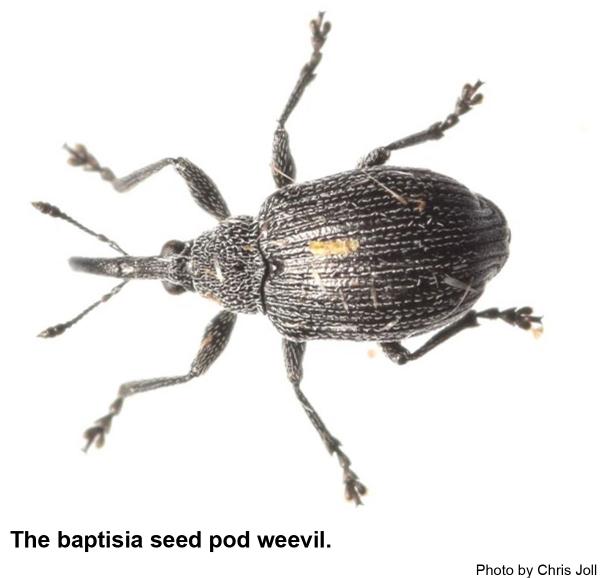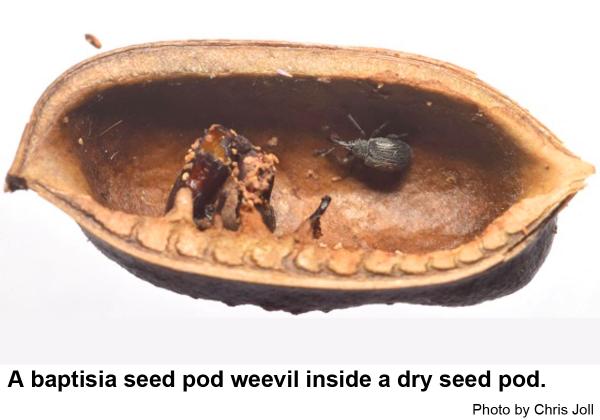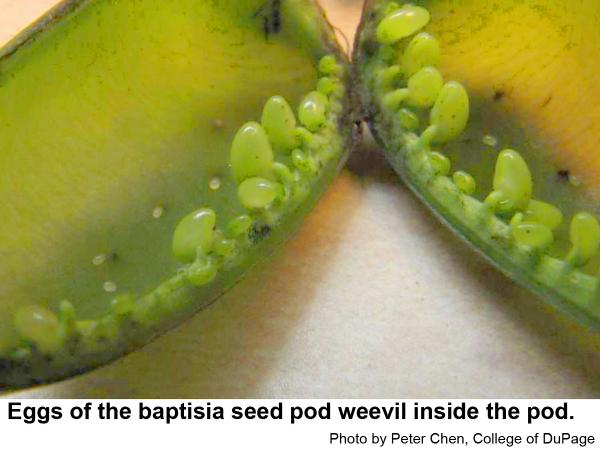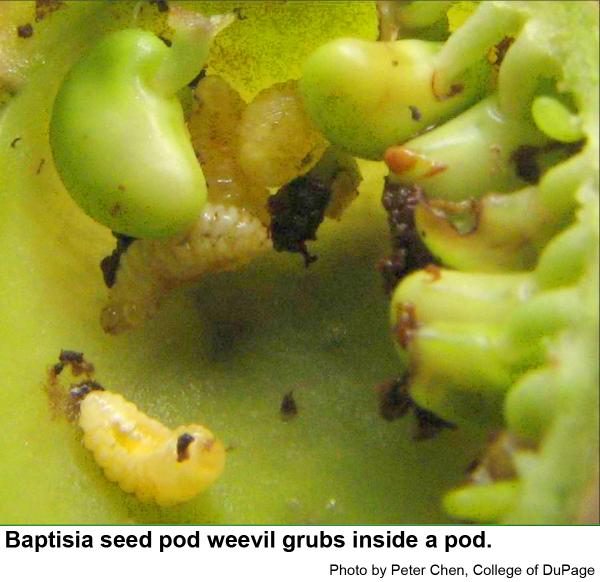Description and Biology
Baptisia Seed Pod weevils, Trichapion Rostrum, are also called baptisia weevils, wild indigo weevils, or Say’s weevils. They are tiny, black beetles with mouthparts located at the tip of a long beak or snout. Including the snout, females are about 1/4 inch long and males about 1/8 inch. These weevils typically oviposit eggs singly into seed pods as the pods begin to swell, but multiple eggs can be laid. Female weevils may have the ability to decide how many eggs to lay in a pod to maximize offspring fitness. (Too many grubs in a pod may cause some to starve.) In addition, females may deter other females from laying additional eggs in a pod by depositing a pheromone deterrent. Adults eat leaves and flowers in very early summer, moving from one Baptisia species to the next as they bloom. When the green pods form, the females bore into them, preferring the larger pods. According to one source, after she excavates the hole in the pod and lays her egg, she uses her snout to push the egg into the pod. Baptisia Seed Pod weevils grubs are typical weevil grubs with white or yellowish, legless bodies and pale brown heads. They feed on developing seeds causing the plant to abort the pods. The grubs pupate inside the pods. New adults must either bore a tiny escape hole in its side or wait for the pod to dry and split to escape. Some adults overwinter in the pods or in soil.
Host Plants
Baptisia seed pod weevils attack the pods of several wild indigos and false indigos. It seems that the denser flower stalks that make some species of Baptisia more attractive to bumblebees (an important pollinator) also make them more attractive to the weevil. Populations of baptisia seed pod weevils wax and wane, but when abundant they may destroy most of the summer’s seed crop.
Residential Recommendations
In one study, "Tanglefoot" applied to the stems of wild indigo reduced the amount of seed predation by trapping the adult beetles crawling up the stems. Insecticides have also been shown to reduce damage when applied in the spring and early summer. Baptisia seed pod weevils feed on foliage, flower buds, and blossoms. One of the pyrethroids labeled for landscape use applied before the flowers open or after flowering should help protect the plants and pods. When used as directed, pyrethroids are very toxic to insects but are not particularly hazardous to humans and pets (other than fish—avoid using pyrethroids around pools, ponds, and streams). This weevil will probably continue to lay eggs during the summer so it is a good idea to spray the plants after blooming as well as before. A problem with spraying while the plants are in bloom is that you may kill pollinators, which is un-American.
Other Resources
- Baptisia Seed Pod Weevils (Family Curculionidae). The Bug Lady. 2011. University of Wisconsin, UWMilwaukee, College of Letters & Science Field Station.
- Impacts of Wild Indigo Weevil on Seed Production in Longbract Wild Indigo. Mundahl, N. D. and K. M. Plucinski. 2010. Proceedings of the North American Prairie Conference 21:163-170.
- Trichapion rostrum (Say) (Brentidae: Apioninae) Infestation of Baptisia alba (L.) Vent. in Mississippi. Whitehouse, R. J. 2018. Transactions of the American Entomological Society, 144(3):559-564
- Wild indigo weevil. Anonymous. 2006. Wisconsin Pest Bulletin 50 (16): 7.
- Extension Plant Pathology Publications and Factsheets
- Horticultural Science Publications
- North Carolina Agricultural Chemicals Manual
For assistance with a specific problem, contact your local N.C. Cooperative Extension center.
This Factsheet has not been peer reviewed.
Publication date: May 14, 2019
Reviewed/Revised: April 14, 2022
Recommendations for the use of agricultural chemicals are included in this publication as a convenience to the reader. The use of brand names and any mention or listing of commercial products or services in this publication does not imply endorsement by NC State University or N.C. A&T State University nor discrimination against similar products or services not mentioned. Individuals who use agricultural chemicals are responsible for ensuring that the intended use complies with current regulations and conforms to the product label. Be sure to obtain current information about usage regulations and examine a current product label before applying any chemical. For assistance, contact your local N.C. Cooperative Extension county center.
N.C. Cooperative Extension prohibits discrimination and harassment regardless of age, color, disability, family and marital status, gender identity, national origin, political beliefs, race, religion, sex (including pregnancy), sexual orientation and veteran status.




